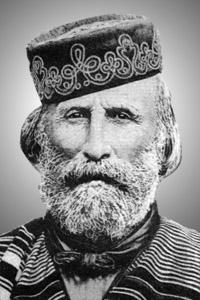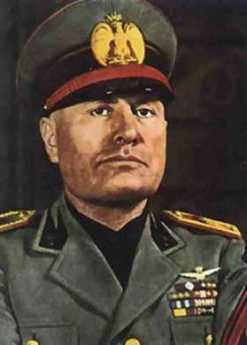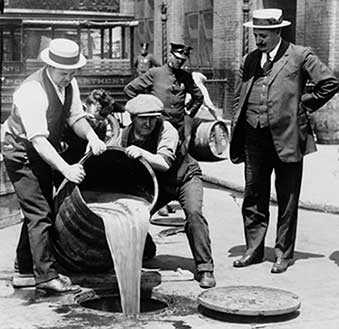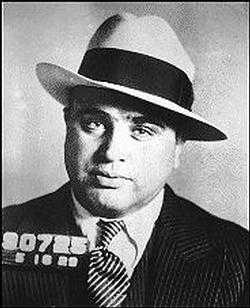Related Topics
Outlaws: Crime in Philadelphia
Even the criminals, the courts and the prisons of this town have a Philadelphia distinctiveness. The underworld has its own version of history.
Philadelphia Legal Scene
The American legal profession grew up in this town, creating institutions and traditions that set the style for everyone else. Boston, New York and Washington have lots of influential lawyers, but Philadelphia shapes the legal profession.
Volunteerism
The characteristic American behavior called volunteerism got its start with Benjamin Franklin's Junto, and has been a source of comment by foreign visitors ever since. It's still a very active force.
Favorites - II
More favorites. Under construction.
Popular Passages
New topic 2013-02-05 15:24:06 description
Philadelphia Mafia: The First Fifty Years
 |
| General Giuseppe Garibaldi |
General Giuseppe Garibaldi unified Italy, but a great many Italians either didn't want to be unified, or emigrated to America after 1860 to escape the turmoil. The far western tip of Sicily was the most remote place in Europe, protected by mountains and volcanoes, speaking its own language, and loyal to no government except its own informal one. Over a period of centuries, secret traditions of feudalism and invisible governance had protected Sicily from invaders of various sorts. Although religion was a powerful force, theirs had traces of the Greek Orthodox Church; allegiance to the Vatican faded out as the local priesthood got closer to it. These people mostly wanted to be left alone, and dealt with outside authority in various devious ways, not stopping with murder if necessary. Informal taxes were collected as "paid protection" since a secret army costs money if only to support funerals and soldiers' widows. Rank within the underground army was identified by various degrees of "honor", which could sound vague but were in fact quite unambiguous. Central to the code of the Sicilian underground government, like all guerilla movements was a strict rule of silence, "omerta". As an intern in a hospital accident room, I have seen members of this organization actually go to their deaths, grimly repeating the mantra, "I don't know nuthin."
 |
| Benito Mussolini |
Italy may have been unified by Garibaldi in the sense of being freed of French, Austrian and Papal domination, but unification was far from peaceful and contented, with losers often choosing emigration. A second wave of emigration was provoked by the harsh rule of the dictator Benito Mussolini, who determined to squelch underground resistance once and for all.
Western Sicilians originally chose New Orleans as their new home, which unfortunately for them already had its own secret society, the Ku Klux Klan. A prompt reaction to the "Italians" with ten or twelve lynchings soon convinced the Sicilians to resettle elsewhere. It seems possible that some of the later techniques of the Mafia were learned from the Klan. In any event, the Sicilians split into two main groups, one going to New York and the other to Philadelphia. Offshoots of the New York group moved to the mining areas of Luzerne County in central Pennsylvania (Hazelton), while another early group migrated to Norristown. There were, of course, links of intermarriage among these groups, but in the early years they drifted apart as separate colonies.
Italian immigrants were no exception to the common tendency of new immigrant groups to gravitate into crime. Records of the Pennsylvania police and jail systems for three centuries show successive waves of inmates with surnames identifying Scottish, then German, then Irish, and eventually Italians. At present, seventy percent of prison inmates are black. Almost without exception, the main victims of immigrant predation have been members of their own immigrant group. Immigrants are easily victimized, somewhat defenseless, and uncertain of the assistance of local law enforcement. Among the most famous of the lawless predator groups among the Italians was the Black Hand, whose specialty was extortion with notes signed with a black hand symbol, enforced by putting bombs under porches. Locals will show you a place on Ninth Street a couple of blocks from the Pennsylvania Hospital where the Black Hand blew things up. The Black Hand, however, was not the Mafia; it exemplified what the Mafia was formed to control.
The Italian community for fifty years was centered on Christian Street, mostly between Eighth and Ninth, gradually migrating westward toward Eleventh Street. Christian Street had been named by the Swedish Philadelphia colony after their monarchs, but the original Swedes tended to remain in Queen (Christina) Village, along Delaware, while the newer migrants drifted to newer areas. During the Civil War, northern railroads heading south ended in Camden. In time, the main Civil War traffic ferried across the Delaware River to wharves at the foot of Washington Avenue. South Street was the honky-tonk area, with a black community growing along with it. After the War, an immigration station was constructed in the Washington Avenue wharf, and the new Italians tended to settle nearby. As the streets were extended westward, the street names were also extended, but the region of Eighth and Christian was largely open fields when the Italians moved into the area, and never had been Swedish. Although there were forty or more murders in the block of Christian from Eighth to Ninth in ten years after the first World War ("Murderers Row"), in modern times the neighboring region is prized by Italian residents as an extremely safe place to live, because the Don likes it nice and quiet.
While it is probably true this safety net quality might not be so evident to blacks and Vietnamese, the safe streets for Italians feature are universally attributed to the Mafia. The Sicilian group quickly reestablished the secret army of "soldiers" and "dons" (usually one don overseeing ten soldiers), started collecting taxes in the form of protection money from the local residents, and putting one "capo" in overall command. You had to be a Sicilian, and a Western Sicilian at that, to be eligible for membership in this secret army. The hierarchy was secret but could be surmised by the elaborate "respect" paid by one to another.
My office partner, Dr. Robert Gill, tells a story illustrating the paying of respect. He was called in consultation to an Italian home by Dr. Baglivo, a highly respected general practitioner in the Italian community. The two of them walked down Eighth Street, and as they passed a barber shop, Dr. Baglivo suggested they both go in for a haircut. Evidently, the patient to be visited was a very important person, and as they went in the shop, Dr. Baglivo introduced Dr. Gill to the group of assembled loiterers as the big doctor from the Pennsylvania Hospital, come to visit you-know-who with the last name ending in a vowel. The group jumped to their feet, in respect, and the barber turned to the lathered-up, half-shaved man in the barber chair. "You!", he cried out, "Get out of that chair! Let the Doctor have a haircut.!" The man dutifully scrambled out of the chair with shaving cream dripping, and humbly sat in a waiting chair, while the big doctor got his haircut. As they left the shop, payment for the haircut was elaborately refused. The point, of course, is not so much one of respect for the medical profession, as respect for someone who had been chosen to attend a capo.
The Mafia was thought to do a fair amount of slashing and breaking of kneecaps, but killing was not permitted except at the order of the boss, or capo. The police could be fairly tolerant of informal methods of law enforcement, but dead bodies brought newspaper attention where even paid-off politicians might not be able to shield the Organization from "heat". For the first forty years, members of the Mafia were sort of volunteer firemen, earning their living as tradesmen and laborers; Mafiosi were paid protection money but were not generally wealthy. The identity of the capo was for forty years a complete mystery to the non-Sicilian community.
But then, along came Prohibition.
 |
| Prohibition |
Prohibition created big money fairly safely, so bootleggers proliferated widely. It was soon no longer possible for one tightly-knit fraternal organization to intimidate a whole host of petty criminals acting alone or in small groups, so the Mafia was forced to control the bootlegging industry through dominating its sources of supply. As a general rule, "rum-running" involved bringing in conventional brand liquor from Canada. That route made Chicago, Boston and New York the major entry and distribution points for "good stuff". From Philadelphia south, most illegal liquor was "moonshine" or other illegally distilled products. Some liquor was distilled in abandoned buildings and garages, but a substantial amount was distilled in the Pine Barrens of nearby New Jersey. The colorful history of the Teamsters Union can be traced in part to the transportation network established for conveying one form of bootleg or another to its retail destinations. Trucks were often hijacked, so paid protection took a new motorized form. The manpower required soon exceeded the number of Sicilian neighbors related by intermarriage. Local groups had to be coordinated with national groups, requiring the establishment of syndicates and governing councils. Even then, one group of recognized Mafia might collide with another; the resulting murders had to be negotiated through a quasi-judicial appellate system.
 |
| Al Capone |
Philadelphia appears to have had a share of gangland warfare, but mainly that was based in Chicago and New York. In one year, Chicago experienced four hundred gangland murders, Philadelphia only forty. Al Capone came to visit Philadelphia, for reasons unknown, was assured he was most unwelcome and got himself put in jail, for his own protection. Eastern Penitentiary likes to show off his well-decorated cell, to which meals were apparently catered. What was really going on remains a mystery. A group of ten Philadelphia Mafiosi is now known to have gone to New York to participate in the "Castellammerese Wars", where two large New York Mafia groups engaged in a fierce battle for supremacy in what was now a source of vast riches. Occasional lurid episodes like this surfaced in Philadelphia, but the Mob was determined to remain as obscure as possible, and many details are missing or deliberately misrepresented. The essence of it all was that Prohibition had transformed the Mafia from a little vigilante group who imposed law and order on a lawless immigrant community, into a tightly organized army of killers, who mostly devoted their war efforts to exterminating rival tribes, while their daily activities consisted of running marginally tolerable criminal activities like gambling and loan sharking.
sting book by Celeste A. Morello called Before Bruno. In 1927, the Mafia decided they could no longer tolerate the Zanghi gang of four or five or a somewhat larger gang of Lanzetti brothers. On Memorial Day, 1927, several Zanghi members were standing on the corner of Eighth and Christian, when they were approached by several men in black overcoats. Down the street came a car with several others carrying shotguns. After the smoke cleared, three Zanghi (one of them the uncle of Mario Lanza the singer) were lying in a pool of blood, and the car went careening down Christian Street with four Mafiosi, including Salvatore Sabella, crouched on the running boards. "Musky" Zanghi, who was intended as another victim, emerged from the neighboring building and acted like a crazy man. "Sabella," he cried, "Sabella did it!". And he continued to squeal, right into the police station and newspapers. The unthinkable had happened; someone ratted. As it turned out, Sabella was revealed as the Capo himself, and general consternation ensued. Just how this information got circulated is unknown, but a story has it that $50,000 was paid to Musky to shut his mouth, Musky failed to appear in court as a witness, the court system was persuaded to blame the whole thing on an unknown underlying named Quattrana (who went to jail for eight years), everybody else was not guilty, Sabella retired as capo at the remarkably young age of 40 and lived for years in Norristown. In fact, because of the 1929 crash, Sabella the capo had to work as a butcher in Norristown, receiving small gifts as a pension. And, as these undocumented stories would have it, it took fifteen years but eventually someone, surely a friend of Sabella, "got" Musky Zanghi, who was hiding out in New York.And the Lanzetti brothers? Well, they got eliminated, reputedly by Sabella's successors in the organization, but the violence triggered extensive Grand Jury investigations led by Judge Edwin O. Lewis, later the father of Independence Mall. Thereafter, mob rubouts became considerably less frequent. Although newspaper and FBI activity had been extensive, and apparently effective, a more detached view makes it more likely that repeal of the Volstead Act was the major factor causing mob activity to subside.
REFERENCES
| Blood and Honor: Inside the Scarfo Mob, the Mafia's Most Violent Family George Anastasia ISBN-13: 978-0940159860 | Amazon |
| Before Bruno: The History of the Philadelphia Mafia Book 2 C. A. Morello ISBN: 978-0967733425 | Amazon |
| The Last Gangster George Anastasia ISBN-13: 978-0060544232 | Amazon |
| The Last Mouthpiece: The Man Who Dared to Defend the MobRobert F. Simone ISBN-13: 978-09401596932 | Amazon |
REFERENCES
| The Pine Barrens: John McPhee: ISBN-13: 978-0374514426 | Amazon |
Originally published: Saturday, February 17, 2007; most-recently modified: Friday, May 31, 2019
| Posted by: Johnny | Nov 3, 2011 8:36 AM |
| Posted by: Rosario | Mar 24, 2011 10:45 PM |
| Posted by: Rosario | Mar 24, 2011 10:36 PM |
| Posted by: fran | Oct 12, 2010 4:28 PM |
for years Ive tried to discover WHO pulled the trigger on my grandfather.
Any insight?
Tony
| Posted by: Anthony Saldutti Lanzetti | Jun 4, 2010 10:13 AM |
| Posted by: anthony zanghi | May 2, 2010 1:47 PM |
| Posted by: Don McCarthy | Mar 22, 2010 8:35 AM |
| Posted by: jeanette sofia | Jan 16, 2009 4:23 PM |
| Posted by: patrician zanghi | Oct 24, 2007 12:31 AM |
| Posted by: greg marincola | Sep 27, 2007 1:29 AM |
On weekends, when other little girls were having sleep overs and stuff, I was on my way with my mom and my stepdad down to Kensington to get slid through holes in fences and small window openings in order to let the adults in thru the front.
I remeber when they wanted my pop-pop to go with another guy and whack another guy out in the Poconos but it was his friend and he declined, so they tore up his furniture warehouse and I remember sitting in a recliner, spinnning around saying, 'when i see these guys im gonna kick their azz'!
I was only 6.
We had a lot of stuff...christmases rocked and my mom sported a fine white cadillac. Then as the late 80's cam, it all went away and we had nothing...that's the thing about mob life, its great when you have it but when it's over, boy is it over and you find yourself broke and alone. my childhood got pretty nasty from that point on and even now, I can't seem to want to to things the right way...always getting whatever I need from some friend of a friend and expecting everyone to care for me. i am tough, i wont cry and life is hard. i got a divorce because i was too hard to control. i work and make money and dont F around, but I miss it all. And yes, inside, I still want to marry back into it all.
I go down to the near NorthEast now and then and everything is just so ugly and different now. My pop-pop is dead...he was one of the few who didn't get laid out but died a few years back.
Yea, I miss it...but now that I am grown and based on all I have witnessed, it was pretty sad sometimes. I lost a lot of family members due to this and the only way I can describe it all iws the dark and gloomy way they lived in the Godfather movies. Goodfellas next...The Sopranos didnt even come close.
My mom was affected by this. She still isn't right and won't leave the house.
I still choose to live in a very secretive, black market way, even though I have the resources to do everything like everyone else does. all thru my schoolyears, they sent in shrinks to see why I was always so 'i dont give a crap' and wise ass and they still couldnt figure me out. haha
didnt mean to write so much, but I came across this and had to share that the mob life rox for a while, but its an ugly place to be that ruins many lives.
and even though i know this, i still want to go back.
| Posted by: tami | Aug 25, 2007 11:23 AM |
I wonder if any of his decen=dents live Philly. It would be cool to see a picture of him. Thanks for your work doctor. I really appreciate it.
| Posted by: DON GRINER | Aug 19, 2007 9:43 PM |
3601 Walnut Street, Philadelphia
215.898.7595 www.upenn.edu/bookstore
FOR IMMEDIATE RELEASE
Contact: Christine Hibbard
*
Philadelphia Inquirer Reporter Revisits the Philadelphia Mob*
George Anastasia will present "Mobfather: The Story of a Wife and Son Caught in the Web of the Mafia" on March 13 at 7:00 p.m.
In "Mobfather, "Anastasia exposes what it really means to be married to the mob-and fathered by it. Based on years of reporting, thousands of pages of court testimony and extensive interviews, "Mobfather" takes the reader deep into the heart of corruption within the highest ranks of the South Philadelphia Mafia. Revisiting his gangland classic, the author follows up on the fates of all the major players.
"George Anastasia has crafted a gangland masterpiece," says Jerry Capeci, columnist for "GangLandNews.com." "You see the murderous Philadelphia mob through the eyes of a turncoat and relive the daily horror of life in his home from the words of the wife and son whose lives he nearly destroyed."
Anastasia, a veteran reporter with "The Philadelphia Inquirer," has twice been nominated for the Pulitzer Prize. He has won the Sigma Delta Chi Award for magazine reporting based on his coverage of the Thomas Capano-Anne Marie Fahey murder. He is the author of four "New York Times" bestsellers, including "The Summer Wind," "The Last Gangster," ""Blood and Honor: Inside the Scarfo Mob--The Mafia's Most Violent Family," and "The Goodfellas Tapes."
| Posted by: Christine Hibbard | Mar 6, 2007 10:15 AM |
| Posted by: Stuart | Feb 28, 2007 2:54 PM |